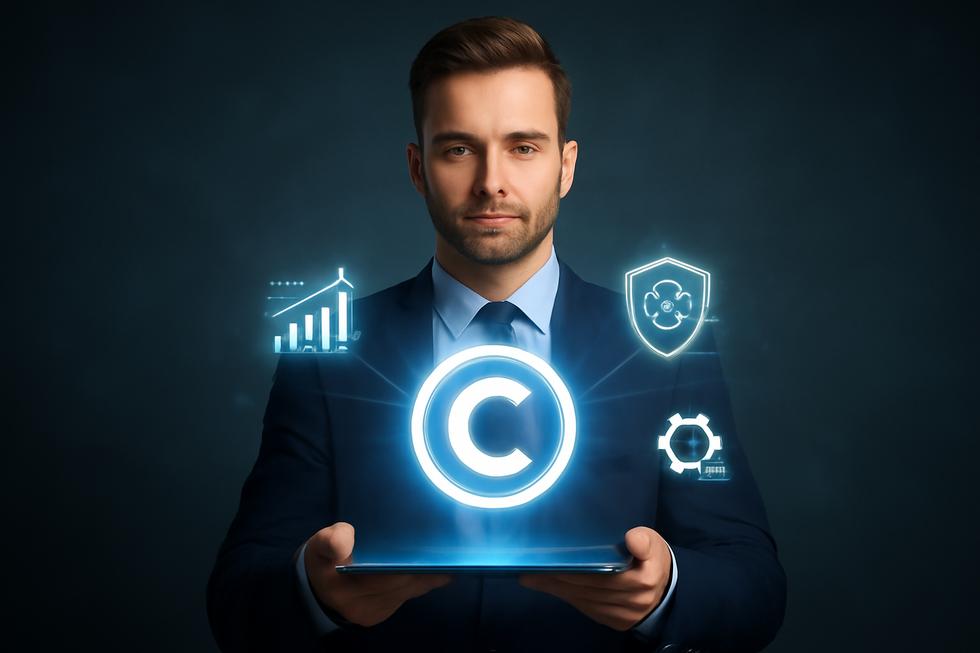Introduction
For business owners, intellectual property is more than just ideas—it’s a valuable asset that drives growth and competitiveness. Understanding the benefits of copyright registration is crucial to securing these assets effectively. By officially registering your copyrights, you not only gain stronger legal protections but also unlock economic advantages and greater control over your creative works. This article delineates how copyright registration can protect your business from infringement, enhance revenue opportunities, and empower you to manage your assets with confidence. Each chapter explores these dimensions, providing a comprehensive view on why copyright registration is an indispensable strategy for safeguarding and monetizing your original works.
Tables of Contents
Chapter 1: Legal Protection Benefits of Copyright Registration
- Strengthening Legal Enforcement and Litigation Outcomes Through Copyright Registration
- Monetary Remedies and Strategic Deterrence: Strengthening Copyright Protection Through Registration
- Establishing Clear Ownership and Legal Evidence through Copyright Registration
Chapter 2: Economic Advantages of Copyright Registration
- Unlocking Financial Rewards: How Copyright Registration Fuels Revenue and Investment
- How Legal Protection and Enforcement Empower Economic Control and Growth
- Harnessing Copyright Registration to Fuel Innovation, Business Growth, and Market Leadership
Chapter 3: Control and Commercialization Benefits of Copyright Registration
- Unlocking Legal Control and Commercial Opportunities Through Copyright Registration
- Unlocking Economic Value: How Copyright Registration Amplifies Market Potential
- Harnessing Strategic Control and Brand Growth Through Copyright Registration
Chapter 1: Legal Protection Benefits of Copyright Registration

1. Strengthening Legal Enforcement and Litigation Outcomes Through Copyright Registration
Copyright registration plays a pivotal role in fortifying the legal enforcement and litigation capabilities of copyright holders. Unlike unregistered works, where remedies and enforcement options remain limited, registration unlocks a suite of powerful legal advantages that enable creators to defend their rights effectively and efficiently. Central to these benefits is the ability to initiate federal lawsuits against copyright infringers. Without registration, copyright owners lack standing to bring infringement claims in federal court, often delaying or limiting their legal recourse. Registration transforms this scenario, providing immediate access to the federal judiciary where infringement matters are handled with rigor and authority.
One of the most compelling enforcement advantages of copyright registration is eligibility for statutory damages. These damages provide a fixed monetary award ranging from $750 to $30,000 per infringed work, which can escalate to $150,000 if the infringement is deemed willful. Importantly, these statutory amounts can be claimed without the need to prove actual financial loss, empowering copyright owners to obtain meaningful compensation even when the infringement’s economic impact is difficult to quantify. This framework not only streamlines recovery but also deters potential infringers by imposing substantial financial risks.
Attorney’s fees recovery is another critical benefit exclusively afforded to registered copyrights. Litigation expenses can be significant, and the prospect of recouping legal costs underpins a copyright owner’s willingness to enforce their rights aggressively. This advantage strengthens the enforcement mechanism by leveling the playing field against infringers who might otherwise exploit the high cost of legal action to evade responsibility.
The copyright registration certificate itself serves as prima facie evidence of both the validity of the copyright and the registrant’s ownership, effectively shifting the burden of proof onto the alleged infringer. This evidentiary weight simplifies the legal process and makes infringement challenges more straightforward. Moreover, early registration—before infringement occurs or within three months of publication—maximizes these enforcement benefits, enabling swifter responses such as takedown notices or settlement initiatives. This timely registration is crucial for locking in full legal protections and avoiding unnecessary delays.
In contrast, unregistered works suffer from significant legal handicaps: they cannot claim statutory damages, recover attorney’s fees, or bring immediate federal court actions. Enforcement often becomes reactive and burdensome, limited by the need to register post-infringement, which weakens the copyright holder’s position.
Beyond litigation, registration enhances the copyright owner’s overall control, allowing vigilant management of unauthorized reproductions or alterations. This control preserves the integrity and commercial value of the work, reinforcing its market position. Additionally, by formalizing ownership and offering federal-recognized evidence, registration encourages continued investment in creative endeavors by providing clear, enforceable rights.
Overall, copyright registration is indispensable for creators seeking robust enforcement and litigation outcomes. It transforms copyright from a passive right into an actively protected asset with legal depth, practical remedies, and strategic deterrence power.
For further detailed guidance on the benefits and mechanisms of copyright registration, the U.S. Copyright Office provides comprehensive information here.
2. Monetary Remedies and Strategic Deterrence: Strengthening Copyright Protection Through Registration
Copyright registration offers creators powerful financial tools and strategic deterrents that elevate their ability to protect original works within the legal system. Beyond simply establishing ownership, registration unlocks access to statutory damages and reimbursement for attorney’s fees—critical financial benefits unavailable to unregistered works. Statutory damages range from $750 to $30,000 per infringed work, presenting a significant monetary incentive for creators to assert their rights. In cases where infringement is willful, damages can escalate dramatically, reaching up to $150,000, further amplifying the protective value of registration. This monetary framework does more than compensate; it empowers rights holders in legal disputes and enhances their leverage in negotiations, licensing, and commercialization efforts.
Fundamental to these financial benefits is the public record created through registration, which documents clear ownership and strengthens a creator’s legal standing. This official record facilitates smoother transactions such as licensing deals and sales agreements, often encouraging greater investment by third parties. Having a registered copyright signals seriousness and preparedness to enforce rights, which can translate into increased revenue streams and broader commercial opportunities.
Alongside financial advantages, registration plays a vital role as a deterrent against infringement. The ability to seek injunctions allows creators to swiftly stop unauthorized uses, a vital component in the rapidly evolving digital landscape where unauthorized reproductions can spread quickly. When potential infringers are aware that statutory damages and legal fees may be imposed, the financial risk often outweighs any perceived gain, discouraging unauthorized copying or distribution. Moreover, for egregious cases involving willful, commercial-scale infringement, criminal penalties including fines and imprisonment further underscore the seriousness of violation, reinforcing deterrence beyond civil remedies.
These deterrence mechanisms not only protect the immediate interests of rights holders but also contribute to a healthier creative ecosystem by discouraging widespread piracy and unauthorized exploitation. By reinforcing the consequences of infringement, copyright registration supports a culture of respect for intellectual property that benefits creators, distributors, and consumers alike.
Together, the financial and deterrent benefits granted by copyright registration create a robust legal environment that empowers creators to defend and monetize their work effectively. This dual impact—strengthening financial recovery prospects while imposing meaningful risks on infringers—positions registration as an indispensable step for anyone serious about securing their intellectual property rights within the U.S. legal framework.
For further insights into protecting your intellectual property rights and understanding the nuances of legal ownership, exploring resources such as do I need a trademark for my business? can provide complementary guidance.
3. Establishing Clear Ownership and Legal Evidence through Copyright Registration
Copyright registration goes far beyond the automatic protection awarded upon the creation of an original work. While copyright exists the moment a work is fixed in a tangible form, formal registration creates an official, public record that unambiguously documents ownership. This public evidence of authorship serves as a powerful tool in ensuring legal clarity and reinforcing the creator’s rights in disputes.
By registering a work, creators establish a concrete presumption that their copyright is valid and that they are the rightful owners. This legal presumption is essential in infringement cases, as it shifts the burden of proof to alleged infringers, streamlining litigation and making it easier to assert rights. The public record produced by registration also functions as a visible deterrent against unauthorized use, putting potential infringers on explicit notice that the work is protected and owned. Such notice reduces accidental infringements and helps protect the creator’s interests before conflicts escalate.
Moreover, registration empowers copyright holders with access to enhanced legal remedies. Unregistered works generally limit the remedies available, but registration opens the door to pursuing remedies like statutory damages and attorney’s fees, which can significantly impact the feasibility and outcome of infringement suits. These remedies provide stronger enforcement incentives and practical advantages, allowing creators to defend their work more effectively. In addition, registration aids in tangible enforcement actions such as DMCA takedown requests, providing legal backing to swiftly challenge unauthorized online reproduction and distribution.
The clarity generated by registration is also invaluable in licensing and commercial contexts. Clear, documented ownership facilitates smoother negotiations and contract enforcement by definitively establishing who controls rights to the work. This clarity benefits creators and businesses alike, fostering confidence in licensing agreements and encouraging investment in creative endeavors.
Taken together, the evidentiary benefits of copyright registration dramatically enhance the legal framework supporting creators. Registration establishes an official, public claim of ownership that bolsters legal standing while improving enforceability against infringement. By reducing uncertainty and signaling clear rights, copyright registration offers creators a robust foundation to protect, monetize, and control their works effectively.
For a deeper understanding of intellectual property protection nuances and how they interrelate with copyrights, exploring trademark considerations may be useful; for guidance, see this resource on whether you need a trademark for your business.
Chapter 2: Economic Advantages of Copyright Registration

1. Unlocking Financial Rewards: How Copyright Registration Fuels Revenue and Investment
Copyright registration plays a pivotal role in transforming creative efforts into tangible economic value. Beyond merely asserting ownership, registration empowers creators with exclusive rights that can be strategically licensed, sold, or monetized, creating essential financial incentives across diverse industries. This exclusivity ensures creators can recoup their investments, generating steady revenue streams that underpin sustained innovation and market growth.
At the core of these economic benefits lies the legal framework that copyright registration establishes. By formally documenting ownership, it facilitates clear, enforceable boundaries around the use of original works. This clarity is critical for negotiating licensing deals or selling rights, as potential partners and investors seek certainty over who holds legitimate claims. For instance, in software development, registered copyrights enable providers to offer exclusive licenses, maximizing income while deterring unauthorized copying, which could significantly erode profitability.
Equally significant is the empowerment provided by legal enforcement. Registration is often a prerequisite for initiating federal lawsuits against infringement, a tool that protects creators from detrimental revenue loss due to piracy or unauthorized reproductions. This enhanced ability to safeguard rights not only secures current earnings but also preserves the long-term economic viability of creative assets. The potential to claim statutory damages and recover attorney’s fees further strengthens the financial position of registered copyright holders.
Moreover, copyright registration opens avenues for strategic intellectual property management, including tax efficiency and income structuring. When copyrights are held within favorable jurisdictions, creators and businesses can reduce tax liabilities on income derived from royalties. This optimization increases net profits and makes investment in creative works more attractive, encouraging greater dedication of resources toward producing quality content.
The economic advantages extend into the thriving creator economy, where original content such as music, videos, and art relies heavily on copyright protection. Registered copyrights are indispensable for commercializing these works through licensing agreements or collaborations, ensuring creators maintain control over distribution and retain rightful earnings. This clear legal standing encourages partnerships and innovative business models that amplify revenue potential.
In this light, copyright registration emerges not just as a protective measure but as a foundational economic tool. It enables creators to harness their intellectual assets effectively, turning creativity into a sustainable source of income and growth. This dynamic underpins industry standards and market confidence, reinforcing the vital role that copyright registration plays in driving the financial success and continuous innovation of creative enterprises.
For a deeper understanding of related intellectual property protections and their business implications, consider exploring insights on trademark considerations for businesses.
2. How Legal Protection and Enforcement Empower Economic Control and Growth
Copyright registration plays a pivotal role in strengthening the economic position of creators and rights holders by providing robust legal protections that underpin their exclusive commercial control. At its core, registering a copyright creates an official public record establishing clear ownership. This formality enables creators to assert exclusive rights to reproduce, distribute, and license their works with confidence. Exclusive ownership not only facilitates direct revenue through sales but also unlocks myriad opportunities for monetization through licensing arrangements, partnerships, and commercial exploitation. Such exclusivity incentivizes creators and businesses to invest in producing and promoting original content, knowing their economic interests will be safeguarded.
Beyond mere proof of ownership, copyright registration unlocks significant enforcement advantages that preserve economic value. Registered works grant the right holder statutory remedies in infringement disputes, including eligibility for statutory damages and recovery of attorney’s fees. This powerful deterrent discourages unauthorized copying and piracy, reducing losses that could severely diminish the commercial potential of creative works. By signaling legal protection publicly, registration creates a marketplace where works command higher respect and valuation, attracting investors and licensees eager to engage with clearly protected intellectual property.
The clarity brought by registration also facilitates smoother licensing negotiations. When ownership and copyright validity are indisputable, negotiations are more straightforward and less prone to costly disputes. This clarity enhances the marketability of copyrighted material, augmenting its value as a business asset. Creators and enterprises can confidently leverage registered copyrights to negotiate licensing deals that reflect the true worth of their intellectual property, thereby generating ongoing income and expanding economic reach.
Moreover, these protections stimulate broader industry innovation by granting creators a secure period to recoup investments. This limited monopoly encourages continuous content creation, especially in highly competitive fields like software development, publishing, and media. The economic growth fostered by this system benefits entire creative industries by driving competition and incentivizing higher-quality outputs. While some might argue that copyright’s restrictive aspects could limit derivative creativity or raise consumer costs, this balance preserves incentives for sustained innovation alongside fair access.
In summary, registering a copyright is not simply a legal formality but a strategic economic tool. It secures exclusive rights that drive direct and indirect revenue, bolsters enforcement to prevent costly infringements, and cultivates a commercial environment conducive to creative investment and innovation. Protecting and enhancing the economic interests of creators through registration therefore lies at the heart of the copyright system’s goal to promote a vibrant, dynamic creative economy.
For a detailed exploration of the economic impact of copyright enforcement and rights management, see the analysis by Trademark Gold on copyright statements’ economic impact (2025): https://trademark2go.com/.
3. Harnessing Copyright Registration to Fuel Innovation, Business Growth, and Market Leadership
Copyright registration plays a pivotal role in unlocking the full economic potential of creative works by offering a legal foundation for innovation, business expansion, and market positioning. By officially establishing ownership, registration provides creators and enterprises with a crucial competitive edge that goes beyond mere protection — it transforms intellectual property into a strategic economic asset.
At the heart of these economic benefits lies the incentive to innovate. When creators and companies secure copyright registration, they gain exclusive rights to their work, effectively shielding their creations from unauthorized replication. This exclusivity encourages continuous investment in research and development, fueling creative efforts and new product development. The assurance that innovative ideas and original expressions are legally safeguarded motivates sustained contributions to the cultural and commercial landscape.
Copyright registration also serves as a gateway to expanding revenue through diversified monetization strategies. Registered works can be licensed, sold, or otherwise commercialized with confidence, generating multiple income streams. For instance, software developers, authors, musicians, and designers can leverage registration to negotiate licensing agreements that enable controlled use of their work while retaining key rights. This capability not only safeguards quality and brand reputation but also propels market growth by broadening the reach and commercial viability of creative products.
From a strategic business perspective, registered copyrights elevate a company’s standing in competitive markets. Ownership documentation signals credibility and innovation to customers, partners, and investors. This perception often translates into increased market trust and opportunities to forge lucrative partnerships. Furthermore, a registered copyright portfolio can become a tangible indicator of a company’s value, attracting investment by reducing risks related to intellectual property infringement and enhancing overall stability. Companies that maintain robust protection of their creative assets command greater influence in negotiations and have stronger leverage to deter competitors who might attempt unauthorized use.
Legal enforcement strengthens these economic advantages by simplifying disputes over ownership and infringement. Copyright registration provides the necessary legal presumption of validity, streamlining litigation efforts to protect market share. This deterrence against piracy and infringement preserves revenue streams and reinforces the rights holder’s authority, ultimately supporting sustained innovation and commercial viability.
Altogether, the economic benefits of copyright registration extend far beyond initial protection. They encompass driving a virtuous cycle where legal security spurs innovation, monetization opportunities multiply, and market position solidifies. This combination benefits individual creators and businesses alike, cultivating an environment where investment in creative endeavors is encouraged and rewarded.
For businesses seeking a comprehensive understanding of protecting creative content within the evolving creator economy, this legal framework guide for copyright-protected content offers valuable insights.
Chapter 3: Control and Commercialization Benefits of Copyright Registration

1. Unlocking Legal Control and Commercial Opportunities Through Copyright Registration
Copyright registration fundamentally reinforces a creator’s legal control over their work by formally establishing ownership rights in a public record. This formal registration provides more than just evidence of creation; it creates a presumption of validity and ownership that is pivotal when legal disputes arise. Without registration, a copyright holder’s ability to enforce their rights is limited, as they cannot file federal lawsuits for infringement or claim statutory damages and attorney’s fees. Registration thus empowers owners with robust legal tools, enabling them to defend the integrity of their works in court with greater effectiveness and credibility.
Beyond litigation, legal control through registration grants the copyright owner exclusive rights to reproduce, distribute, modify, and publicly display their work. These rights form the foundation for preventing unauthorized use and controlling how the work is shared or adapted. Registration’s public record acts as a clear, accessible declaration of ownership, serving as a strong deterrent against infringement by signaling legitimate claims to anyone wishing to use the work. This legal clarity reduces uncertainties that often lead to unauthorized exploitation and supports creators in sustaining the value their works generate.
Crucially, copyright registration opens the door to vast commercialization opportunities. Ownership clarity allows creators and businesses to monetize their works under controlled terms through licensing agreements or outright sales. By legally defining who holds the rights, registration facilitates negotiated deals that can yield ongoing revenue streams, incentivizing innovation and investment. Control over licensing not only protects the creator’s financial interests, but also safeguards the quality and reputation of the work in the marketplace. Licensing restrictions ensure that modifications or uses of the creative material align with the owner’s standards and commercial goals.
Moreover, the legal framework established by copyright registration elevates public trust in the rightful ownership of creative content. The presence of official copyright statements tied to registered works functions as a legal notice to the public. This fosters a culture of respect for intellectual property and encourages lawful use, reducing incidents of piracy and unauthorized exploitation. Such deterrence benefits all stakeholders by supporting a healthier creative economy where originality and fair compensation thrive.
In essence, copyright registration offers a dual advantage: it equips owners with strong legal enforcement mechanisms while simultaneously enhancing the ability to commercialize their works efficiently and securely. This synergy between legal control and commercial potential makes registration a vital strategic step for creators and businesses aiming to maximize both protection and financial return from their creative assets. For those looking to expand their intellectual property portfolio beyond copyrights, understanding trademark basics could be equally important, as explained in detail here.
These combined benefits highlight why registration is more than a procedural formality—it’s a critical investment in securing the full value and longevity of original creative works.
2. Unlocking Economic Value: How Copyright Registration Amplifies Market Potential
Copyright registration plays a pivotal role in elevating the economic and market potential of creative works by providing undeniable legal validation and opening diverse monetization pathways. At its core, the act of registration establishes an official record that affirms the creator’s ownership and the creation date, lending critical weight to any claim against unauthorized use. This concrete proof not only discourages infringement but also significantly strengthens the creator’s negotiating position when engaging with potential licensees or buyers. By securing a clear legal standing, registered copyrights transform intangible creative efforts into valuable assets recognized by markets and investors alike.
This enhanced legal credibility substantially increases a work’s attractiveness and commercial value. Registered copyrights facilitate smoother licensing agreements and transactional sales, as interested parties often prefer engaging with works backed by formal documentation. The ability to license a registered copyright encourages creators to leverage their intellectual property through strategic partnerships and revenue-sharing models. These arrangements generate sustained income streams, allowing creators and businesses to capitalize on their innovations beyond initial sales, thus reinvesting in further creative development.
Moreover, copyright registration contributes broadly to economic growth by underpinning industries dependent on intellectual property. Creative sectors—ranging from publishing to software development—rely heavily on the enforceability of rights that registration solidifies. By limiting losses due to infringement and piracy, registration helps preserve revenues that fuel job creation and innovation cycles. The economic incentive embedded in exclusive rights drives continuous investments in new projects, as creators are assured of reaping financial rewards during the copyright term. This positive feedback mechanism fosters a robust environment where creativity and commercial success coexist.
The ability to maintain control over how creative works are disseminated and monetized also reinforces brand integrity and product quality. When copyrights are registered, creators hold stronger influence over reproductions, adaptations, and distributions. This mitigates risks of unauthorized alterations that could undermine market reputation or dilute value. Such control is essential for sustaining consumer trust and for negotiating lucrative deals, especially in markets where originality and authenticity command premium prices.
In sum, copyright registration serves as a foundational tool enabling creators and businesses to unlock the full economic potential of their works. It ensures legal certainty that enhances market confidence, opens flexible revenue opportunities, and supports a healthy creative ecosystem integral to economic vitality. For those seeking to maximize the commercial benefits of their intellectual property, registration is not merely advisable—it is essential. For additional insights on protecting creative works and managing intellectual property assets, refer to relevant resources on copyright infringement.
3. Harnessing Strategic Control and Brand Growth Through Copyright Registration
Copyright registration serves as a powerful strategic tool that enhances a creator’s or business’s control over their intellectual property while driving commercial growth and brand development. At its core, registering a copyright grants the owner exclusive legal rights to reproduce, distribute, display, and modify the work. This level of control is essential not only to protect the originality and integrity of the creation but also to manage how it reaches the public and commercial markets. Unlike unregistered works, those registered carry a legal presumption of ownership validity, enabling the owner to pursue robust enforcement measures, including filing federal lawsuits, securing injunctions, and claiming statutory damages and attorney’s fees. These legal mechanisms significantly deter infringement and unauthorized use, thereby safeguarding the work’s value and the creator’s long-term interests.
Beyond legal protection, copyright registration plays a crucial role in sustaining and building a brand’s identity and reputation. By preserving consistent quality and authorized usage of creative content, registration helps maintain customer trust and loyalty. Content that is well-protected from unauthorized alterations or distribution reinforces brand promise and messaging, contributing to a cohesive market presence. This consistency is vital for businesses that rely on creative works as a cornerstone of their brand experience, ensuring that the brand’s voice remains authentic and reliable in the eyes of consumers.
Moreover, registration unlocks extensive commercialization possibilities. Ownership clarity facilitates licensing agreements, allowing the copyright holder to monetize the work through sales, sublicensing, or partnerships. These revenue streams can be diversified, offering financial incentives to reinvest in innovation or scale business operations. Licensing also enables strategic collaborations, expanding the work’s reach without sacrificing control. The ability to clearly assert ownership in contractual negotiations adds valuable leverage and reduces risks, making business dealings more secure and transparent.
From a strategic financial perspective, holding registered copyrights can transform intellectual property into recognized assets on a company’s balance sheet. This recognition can offer negotiation advantages, serve as collateral, and in some jurisdictions, provide tax benefits by acknowledging the economic value of these intangible assets. It also signals to investors and partners a professional approach to intellectual property management, enhancing credibility and potential growth opportunities.
Together, these elements—exclusive control, enhanced legal protection, brand consistency, and multifaceted commercialization avenues—work in concert to amplify the overall value of creative works. Copyright registration is not just a defensive legal step; it is a proactive strategy to reinforce brand strength, maximize income potential, and secure competitive advantages in the marketplace.
For further exploration of these strategic benefits, see detailed insights on the nuances of intellectual property management at trademark2go.com.
Final thoughts
Copyright registration represents a cornerstone investment for business owners seeking to secure, manage, and profit from their creative assets. By officially registering copyrights, businesses unlock robust legal protections that deter infringement and empower enforcement in federal courts. These protections form the foundation for the economic advantages gained through licensing, partnerships, and revenue growth. Equally important is the enhanced ability to control the use and distribution of your work, preserving quality and maximizing commercial potential. Together, these benefits make copyright registration a vital strategy to protect your business’s intellectual property, build market value, and foster continued innovation and success.
Your IP is the foundation of your success – let’s protect it together before it’s too late. We can’t wait to help you turn your ideas into legally secured assets.
About us
At trademark2go.com, we’re your go-to partners for simplifying trademark, patent, and copyright registration. Our team of IP experts cuts through legal complexity, avoids common pitfalls, and delivers personalized guidance – whether you’re a startup, inventor, or creator. We prioritize your goals, turning your ideas into legally secured assets with clarity and care. Let’s protect what drives your success, together.


